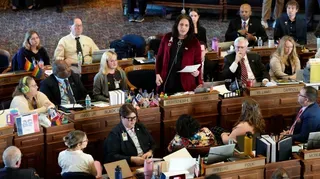May 31, 2014
In SF, PrEP Talk Draws A Crowd
Kilian Melloy READ TIME: 5 MIN.
More than 100 people packed the Eureka Valley Recreation Center for the latest San Francisco AIDS Foundation Real Talk forum on antiretroviral treatment as prevention and pre-exposure prophylaxis - or PrEP - for HIV.
The forum asked whether being HIV-positive with an undetectable viral load is the "new negative." To make informed decisions about risk today, it is not enough to simply know whether someone is positive or negative - or thinks he is - but also what he is doing in terms of treatment or biomedical prevention.
"We have to think about what it means to have sex today - in 2014, not in 1992," urged moderator David Evans of Project Inform. "I remember those very dark years, but we're not there anymore. New research has given people more options."
A diverse range of prevention options is more important than ever, according to an unscientific on-the-spot audience phone poll at the May 20 forum. Almost all participants (96 percent) said they had ever had sex without a condom, while 85 percent said they'd had sex with someone of a different HIV status. A majority (60 percent) said they would rather have condomless sex with a person who is HIV-positive with an undetectable viral load, while 19 percent said they would rather do it with someone HIV-negative and 21 percent were not sure.
The latest data continue to show that effective HIV treatment dramatically reduces the risk of sexual transmission. An interim analysis from the Partner Study, reported at the retrovirus conference in March, revealed no cases of HIV transmission among more than 700 serodiscordant couples - including 40 percent same-sex male couples - when the positive partner was on treatment with an undetectable viral load. But the study is still ongoing and seeing no transmissions so far does not mean the risk is zero.
Audience members noted that some HIV-positive men using Grindr and other hook-up apps are now declaring not only that they are positive and on treatment, but even what undetectable viral load threshold they fall under. And some HIV-negative men are stating that they are using PrEP, or taking the antiretroviral combination pill Truvada, to prevent infection.
But some people who regularly take antiretroviral therapy can still be detectable, explained Dr. Joanna Eveland of Mission Neighborhood Health Center. Viral load "blips," or transient increases, are not uncommon, and people may miss drug doses or stop treatment temporarily, for example due to loss of insurance coverage. Someone who thinks he is negative may have recently become infected, a period when viral load is at its highest.
"It should be like [an expiration date] on a milk carton," she suggested. "After a certain date you have to change your status."
Focus on PrEP
While the forum title referred to HIV-positive people on treatment, the focus of discussion quickly turned to PrEP for HIV-negative people. The audience poll revealed that 70 percent of participants were themselves using or knew someone who was using PrEP and 86 percent think it is a viable option to prevent HIV infection.
PrEP has been a major topic of discussion, online and off, after Michael Weinstein of the AIDS Healthcare Foundation recently called Truvada a "party drug' in an Associated Press interview and pioneering AIDS activist Larry Kramer said that people taking PrEP have "got to have rocks in their heads."
New Centers for Disease Control and Prevention guidelines released earlier this month state that health care providers should consider advising people at "substantial risk" to use PrEP to prevent HIV infection. The Food and Drug Administration approved Gilead Sciences' Truvada (tenofovir plus emtricitabine) for PrEP in July 2012.
According to the guidelines, PrEP should be considered for people in an ongoing sexual relationship with an HIV-positive partner, gay or bisexual men who have had sex without a condom or been diagnosed with a sexually transmitted infection within the past six months, heterosexual men or women who do not always use condoms when having sex with partners known to be at risk for HIV, and anyone who has recently injected illicit drugs and shared equipment or been in a treatment program for injection drug use.
The guidelines reflect research showing the effectiveness of PrEP for different populations. The iPrEx trial of mostly gay and bisexual men found that taking Truvada once-daily reduced the risk of HIV infection by 42 percent overall, rising to more than 90 percent among participants with blood drug levels indicating regular use.
Panelist David Waggoner said his doctor suggested a few years ago that Truvada PrEP might help him stay negative, after he had requested post-exposure prophylaxis (taking antiretrovirals after sex to prevent infection). While it once sounded daunting to take a daily pill, he has gotten used to it and now takes Truvada with lunch every day. He added that he has never experienced any side effects.
People starting Truvada can sometimes have a "start-up syndrome" with headaches, nausea, and flatulence, these are usually minimal and typically subside, according to Eveland. Kidney toxicity and bone loss are potential side effects of tenofovir, but these have not been seen in PrEP studies so far and regular monitoring can reveal problems before they become serious.
Dr. Robert Grant, SFAF's new chief medical officer and iPrEx lead investigator, explained that one of the strengths of PrEP is that you can take Truvada any time during the day.
"You may be drunk at midnight, but you can take it when you're in a calm moment and your life may be better organized," he said.
Further, Truvada offers some "forgiveness" since drug levels build up in the body and allow for an occasional missed dose. "Having used a condom yesterday provides no protection if you don't use a condom today," Grant said. 'But if [Truvada] has been taken for several months, we think protection may last a few days, maybe as long as a week."
However, only Truvada taken every day has been approved for HIV prevention. Taking it sporadically before sex or as a "morning after pill" has not been shown to be effective.
Asked who might be a good candidate for PrEP, Grant said, "Anyone who wants to take it."
"A bad breakup is a situation that should make people ask if maybe they should be taking PrEP for a year," he suggested. "It's not only for sero-different partners, but even more for people who have negative partners who have sex with other partners, or partners of unknown status."
Sex and Stigma
The idea that gay men are using Truvada to have condomless sex they shouldn't be having is one of the key issues in the ongoing PrEP debate.
"HIV prevention for gay men is getting more like birth control for straight people," Eveland suggested. "There's a lot of controversy about people having too much sex, which happened also with birth control."
Waggoner said he was surprised at the level of stigma associated with PrEP.
"I'm amazed that in 2014 there's still so much stigma, so much judgment and mean-spiritedness in our community," said Waggoner, who sported a #TruvadaWhore T-shirt. "There's still so much emotion and negative judgment about gay men and their sex lives. [Truvada] is not a party drug, it's a way to live our lives with dignity."
While providers in the Bay Area are increasingly aware of PrEP - and most insurers are covering it - education is still needed.
"So far we've found at Project Inform that the biggest obstacle to PrEP are providers," Evans told the Bay Area Reporter . "Providers may be uncomfortable talking about sex, don't known about Truvada as PrEP, or are scared of providing antiretrovirals. Having such clear and straightforward guidelines from the CDC provides a new weight of leverage."
Grant agreed.
"There are still many doctors that don't know about it," he said. "They may say just use condoms or have fewer partners. Patients have a role in educating their doctors."
Kilian Melloy serves as EDGE Media Network's Associate Arts Editor and Staff Contributor. His professional memberships include the National Lesbian & Gay Journalists Association, the Boston Online Film Critics Association, The Gay and Lesbian Entertainment Critics Association, and the Boston Theater Critics Association's Elliot Norton Awards Committee.





